-
44 results in Exploration of Digital Health TechnologiesSort byMost Downloaded
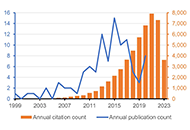 Digital health and mobile health: a bibliometric analysis of the 100 most cited papers and their contributing authorsOpen AccessOriginal ArticleAim: This study aimed to identify and analyze the top 100 most cited digital health and mobile health (m-health) publications. It could aid researchers in the identification of promising new rese [...] Read more.Andy Wai Kan Yeung ... Atanas G. AtanasovPublished: April 22, 2024 Explor Digit Health Technol. 2024;2:86–100
Digital health and mobile health: a bibliometric analysis of the 100 most cited papers and their contributing authorsOpen AccessOriginal ArticleAim: This study aimed to identify and analyze the top 100 most cited digital health and mobile health (m-health) publications. It could aid researchers in the identification of promising new rese [...] Read more.Andy Wai Kan Yeung ... Atanas G. AtanasovPublished: April 22, 2024 Explor Digit Health Technol. 2024;2:86–100
DOI: https://doi.org/10.37349/edht.2024.00013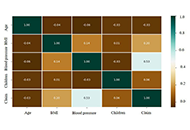 Use of responsible artificial intelligence to predict health insurance claims in the USA using machine learning algorithmsOpen AccessOriginal ArticleAim: This study investigates the potential of artificial intelligence (AI) in revolutionizing healthcare insurance claim processing in the USA. It aims to determine the most effective machine lea [...] Read more.Ashrafe Alam, Victor R. PrybutokPublished: February 28, 2024 Explor Digit Health Technol. 2024;2:30–45
Use of responsible artificial intelligence to predict health insurance claims in the USA using machine learning algorithmsOpen AccessOriginal ArticleAim: This study investigates the potential of artificial intelligence (AI) in revolutionizing healthcare insurance claim processing in the USA. It aims to determine the most effective machine lea [...] Read more.Ashrafe Alam, Victor R. PrybutokPublished: February 28, 2024 Explor Digit Health Technol. 2024;2:30–45
DOI: https://doi.org/10.37349/edht.2024.00009
This article belongs to the special issue Data-informed Decision Making in Healthcare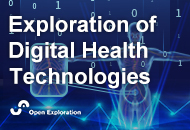 Turbulence at Twitter with leadership change: implications for health research and science communicationOpen AccessPerspectiveTwitter has been an invaluable social media platform for scientists to share research and host discourse among academics and the public. The change of ownership at Twitter has changed how scientists [...] Read more.Ronan Lordan, Hari Prasad DevkotaPublished: November 01, 2023 Explor Digit Health Technol. 2023;1:4–10
Turbulence at Twitter with leadership change: implications for health research and science communicationOpen AccessPerspectiveTwitter has been an invaluable social media platform for scientists to share research and host discourse among academics and the public. The change of ownership at Twitter has changed how scientists [...] Read more.Ronan Lordan, Hari Prasad DevkotaPublished: November 01, 2023 Explor Digit Health Technol. 2023;1:4–10
DOI: https://doi.org/10.37349/edht.2023.00002
This article belongs to the special issue Social Media Applications in Biomedical Research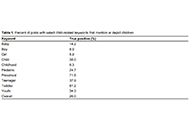 Identifying children’s environmental health risks, needs, misconceptions, and opportunities for research translation using social mediaOpen AccessCommentaryAs part of the Advancing Science, Practice, Programming, and Policy in Research Translation for Children’s Environmental Health (ASP3IRE) center, machine learning, geographic information systems ( [...] Read more.Andrew Larkin ... Perry HystadPublished: April 08, 2024 Explor Digit Health Technol. 2024;2:59–66
Identifying children’s environmental health risks, needs, misconceptions, and opportunities for research translation using social mediaOpen AccessCommentaryAs part of the Advancing Science, Practice, Programming, and Policy in Research Translation for Children’s Environmental Health (ASP3IRE) center, machine learning, geographic information systems ( [...] Read more.Andrew Larkin ... Perry HystadPublished: April 08, 2024 Explor Digit Health Technol. 2024;2:59–66
DOI: https://doi.org/10.37349/edht.2024.00011
This article belongs to the special issue Social Media Applications in Biomedical Research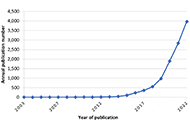 Exploration of Digital Health TechnologiesOpen AccessEditorialAtanas G. AtanasovPublished: November 01, 2023 Explor Digit Health Technol. 2023;1:1–3
Exploration of Digital Health TechnologiesOpen AccessEditorialAtanas G. AtanasovPublished: November 01, 2023 Explor Digit Health Technol. 2023;1:1–3
DOI: https://doi.org/10.37349/edht.2023.00001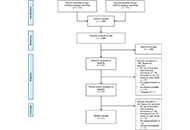 Data science techniques to gain novel insights into quality of care: a scoping review of long-term care for older adultsOpen AccessSystematic ReviewBackground: The increase in powerful computers and technological devices as well as new forms of data analysis such as machine learning have resulted in the widespread availability of data scienc [...] Read more.Ard Hendriks ... Sil AartsPublished: April 12, 2024 Explor Digit Health Technol. 2024;2:67–85
Data science techniques to gain novel insights into quality of care: a scoping review of long-term care for older adultsOpen AccessSystematic ReviewBackground: The increase in powerful computers and technological devices as well as new forms of data analysis such as machine learning have resulted in the widespread availability of data scienc [...] Read more.Ard Hendriks ... Sil AartsPublished: April 12, 2024 Explor Digit Health Technol. 2024;2:67–85
DOI: https://doi.org/10.37349/edht.2024.00012
This article belongs to the special issue Data-informed Decision Making in Healthcare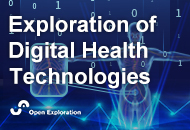 Warning: Artificial intelligence chatbots can generate inaccurate medical and scientific information and referencesOpen AccessLetter to the EditorThe use of generative artificial intelligence (AI) chatbots, such as ChatGPT and YouChat, has increased enormously since their release in late 2022. Concerns have been raised over the potential of c [...] Read more.Catherine L. Clelland ... James D. ClellandPublished: January 10, 2024 Explor Digit Health Technol. 2024;2:1–6
Warning: Artificial intelligence chatbots can generate inaccurate medical and scientific information and referencesOpen AccessLetter to the EditorThe use of generative artificial intelligence (AI) chatbots, such as ChatGPT and YouChat, has increased enormously since their release in late 2022. Concerns have been raised over the potential of c [...] Read more.Catherine L. Clelland ... James D. ClellandPublished: January 10, 2024 Explor Digit Health Technol. 2024;2:1–6
DOI: https://doi.org/10.37349/edht.2024.00006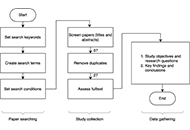 Do you need a blockchain in healthcare data sharing? A tertiary reviewOpen AccessSystematic ReviewBackground: This study addresses the complexities of utilizing blockchain technology in healthcare, aiming to provide a decision-making tool for healthcare professionals and policymakers evaluati [...] Read more.Kun Li ... Visara UroviPublished: June 14, 2024 Explor Digit Health Technol. 2024;2:101–123
Do you need a blockchain in healthcare data sharing? A tertiary reviewOpen AccessSystematic ReviewBackground: This study addresses the complexities of utilizing blockchain technology in healthcare, aiming to provide a decision-making tool for healthcare professionals and policymakers evaluati [...] Read more.Kun Li ... Visara UroviPublished: June 14, 2024 Explor Digit Health Technol. 2024;2:101–123
DOI: https://doi.org/10.37349/edht.2024.00014
This article belongs to the special issue Data-informed Decision Making in Healthcare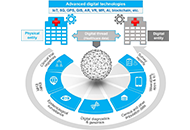 Harnessing the untapped potential of digital twin technology in digital public health interventionsOpen AccessLetter to the EditorDigital technologies have garnered more attention in this epoch of public health emergencies like coronavirus disease 2019 (COVID-19) and monkeypox (mpox). Digital twin (DT) is the virtual cyberneti [...] Read more.Salman Khan ... ArunSundar MohanaSundaramPublished: November 01, 2023 Explor Digit Health Technol. 2023;1:11–16
Harnessing the untapped potential of digital twin technology in digital public health interventionsOpen AccessLetter to the EditorDigital technologies have garnered more attention in this epoch of public health emergencies like coronavirus disease 2019 (COVID-19) and monkeypox (mpox). Digital twin (DT) is the virtual cyberneti [...] Read more.Salman Khan ... ArunSundar MohanaSundaramPublished: November 01, 2023 Explor Digit Health Technol. 2023;1:11–16
DOI: https://doi.org/10.37349/edht.2023.00003
This article belongs to the special issue Social Media Applications in Biomedical Research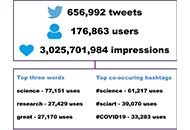 Science communication on X (formerly Twitter): A picture is worth a thousand characters?Open AccessPerspectiveX (formerly Twitter), a microblogging social media platform, is being used by scientists and researchers to disseminate their research findings and promote the visibility of their work to the public [...] Read more.Himel Mondal ... Harald WillschkePublished: November 28, 2023 Explor Digit Health Technol. 2023;1:28–34
Science communication on X (formerly Twitter): A picture is worth a thousand characters?Open AccessPerspectiveX (formerly Twitter), a microblogging social media platform, is being used by scientists and researchers to disseminate their research findings and promote the visibility of their work to the public [...] Read more.Himel Mondal ... Harald WillschkePublished: November 28, 2023 Explor Digit Health Technol. 2023;1:28–34
DOI: https://doi.org/10.37349/edht.2023.00005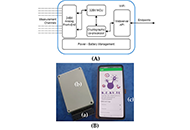 System for classifying antibody concentration against severe acute respiratory syndrome coronavirus 2 S1 spike antigen with automatic quick response generation for integration with health passportsOpen AccessOriginal ArticleAim: After the severe acute respiratory syndrome coronavirus 2 (SARS-CoV-2) pandemic and the realization of mass vaccination against the virus, the availability of a reliable, rapid, and easy-to- [...] Read more.Apostolos Apostolakis ... Spyridon KintziosPublished: February 28, 2024 Explor Digit Health Technol. 2024;2:20–29
System for classifying antibody concentration against severe acute respiratory syndrome coronavirus 2 S1 spike antigen with automatic quick response generation for integration with health passportsOpen AccessOriginal ArticleAim: After the severe acute respiratory syndrome coronavirus 2 (SARS-CoV-2) pandemic and the realization of mass vaccination against the virus, the availability of a reliable, rapid, and easy-to- [...] Read more.Apostolos Apostolakis ... Spyridon KintziosPublished: February 28, 2024 Explor Digit Health Technol. 2024;2:20–29
DOI: https://doi.org/10.37349/edht.2024.00008
This article belongs to the special issue Biosensors for Bioactive Molecules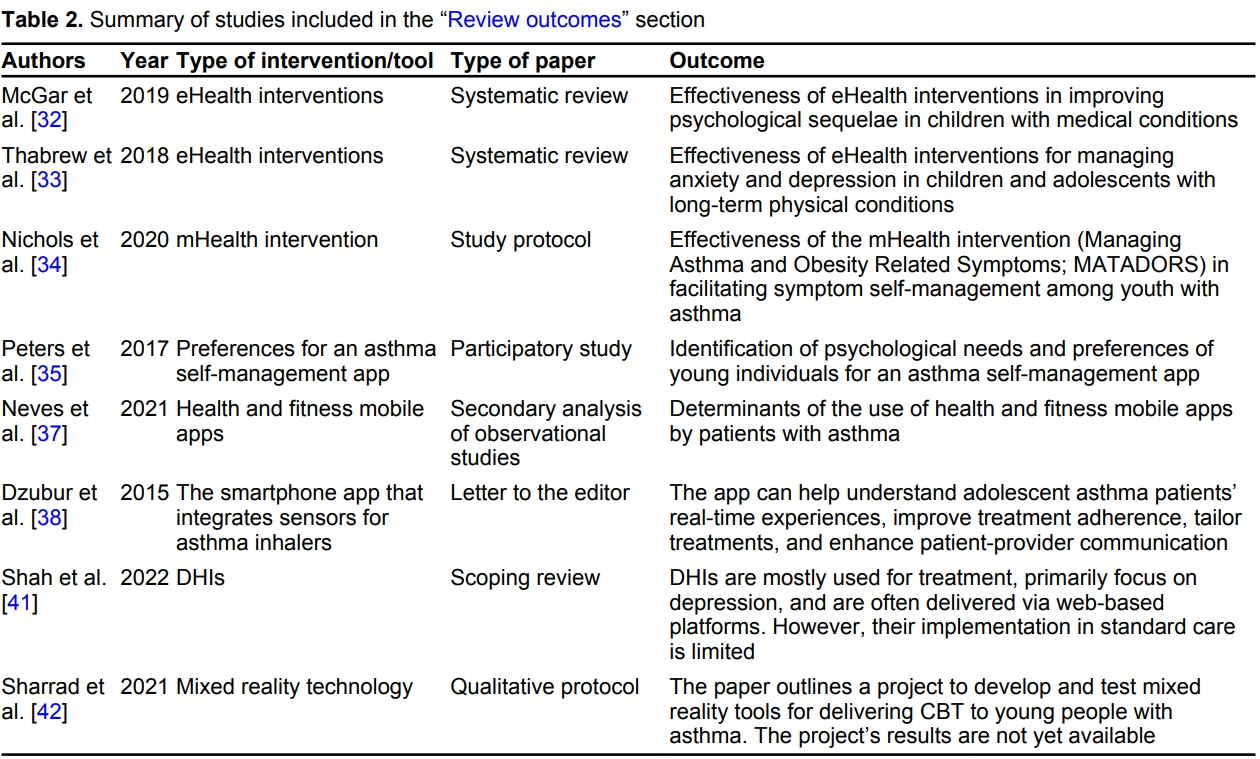 Breathing tech: digital health innovations for managing asthma-related psychological dimensionsOpen AccessReviewThe paper aimed to provide a comprehensive overview of the use of digital health technologies in the assessment, treatment, and self-management of psychological and psychopathological factors associ [...] Read more.Mirko Casu, Pasquale CaponnettoPublished: March 28, 2024 Explor Digit Health Technol. 2024;2:46–58
Breathing tech: digital health innovations for managing asthma-related psychological dimensionsOpen AccessReviewThe paper aimed to provide a comprehensive overview of the use of digital health technologies in the assessment, treatment, and self-management of psychological and psychopathological factors associ [...] Read more.Mirko Casu, Pasquale CaponnettoPublished: March 28, 2024 Explor Digit Health Technol. 2024;2:46–58
DOI: https://doi.org/10.37349/edht.2024.00010
This article belongs to the special issue Telepsychiatry in Low-and Middle-income Countries: an Update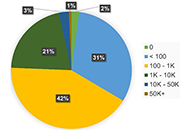 The power of #physiotherapy: a social media hashtag investigation on X (formerly Twitter)Open AccessOriginal ArticleAim: The social media platform X, formerly known as Twitter, has emerged as a significant hub for healthcare-related conversations and sharing information. This study aims to investigate the impa [...] Read more.Himel Mondal ... Atanas G. AtanasovPublished: June 24, 2024 Explor Digit Health Technol. 2024;2:135–144
The power of #physiotherapy: a social media hashtag investigation on X (formerly Twitter)Open AccessOriginal ArticleAim: The social media platform X, formerly known as Twitter, has emerged as a significant hub for healthcare-related conversations and sharing information. This study aims to investigate the impa [...] Read more.Himel Mondal ... Atanas G. AtanasovPublished: June 24, 2024 Explor Digit Health Technol. 2024;2:135–144
DOI: https://doi.org/10.37349/edht.2024.00016
This article belongs to the special issue Social Media Applications in Biomedical Research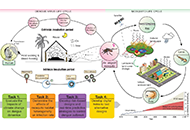 Envisioning urban environments resilient to vector-borne diseases: a protocol to study dengue in VietnamOpen AccessProtocolTransmitted primarily by Aedes aegypti (Ae. aegypti) and Aedes albopictus (Ae. albopictus), arboviral diseases pose a major global public health threat. Dengue, chikungunya, and Zika are increasingl [...] Read more.Praveen Kumar ... Andrew W. Taylor-RobinsonPublished: November 01, 2023 Explor Digit Health Technol. 2023;1:17–27
Envisioning urban environments resilient to vector-borne diseases: a protocol to study dengue in VietnamOpen AccessProtocolTransmitted primarily by Aedes aegypti (Ae. aegypti) and Aedes albopictus (Ae. albopictus), arboviral diseases pose a major global public health threat. Dengue, chikungunya, and Zika are increasingl [...] Read more.Praveen Kumar ... Andrew W. Taylor-RobinsonPublished: November 01, 2023 Explor Digit Health Technol. 2023;1:17–27
DOI: https://doi.org/10.37349/edht.2023.00004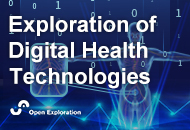 Social media applications in biomedical researchOpen AccessReviewInformation and communication technologies (ICTs) have transformed global connectivity, offering significant support to underserved populations and small businesses in developing nations. The integr [...] Read more.Md Sadique Hussain, Devesh TewariPublished: July 04, 2024 Explor Digit Health Technol. 2024;2:167–182
Social media applications in biomedical researchOpen AccessReviewInformation and communication technologies (ICTs) have transformed global connectivity, offering significant support to underserved populations and small businesses in developing nations. The integr [...] Read more.Md Sadique Hussain, Devesh TewariPublished: July 04, 2024 Explor Digit Health Technol. 2024;2:167–182
DOI: https://doi.org/10.37349/edht.2024.00019
This article belongs to the special issue Social Media Applications in Biomedical Research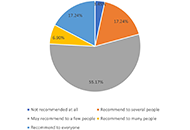 Functionality and feasibility of cognitive function training via mobile health application among youth at risk for psychosisOpen AccessOriginal ArticleAim: Mobile health applications (MHAs) have been rapidly designed and urgently need evaluation. Existing evaluation methods, such as platform, development, and subjective overall user observation [...] Read more.Huijun Li ... Jijun WangPublished: February 27, 2024 Explor Digit Health Technol. 2024;2:7–19
Functionality and feasibility of cognitive function training via mobile health application among youth at risk for psychosisOpen AccessOriginal ArticleAim: Mobile health applications (MHAs) have been rapidly designed and urgently need evaluation. Existing evaluation methods, such as platform, development, and subjective overall user observation [...] Read more.Huijun Li ... Jijun WangPublished: February 27, 2024 Explor Digit Health Technol. 2024;2:7–19
DOI: https://doi.org/10.37349/edht.2024.00007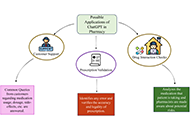 Harnessing the potential of ChatGPT in pharmacy management: a concise reviewOpen AccessReviewChatGPT is one of the promising AI-based language models which has the potential to contribute to pharmacy settings in many aspects. This paper focuses on the possible aspects of pharmacy management [...] Read more.Abdullah Al Noman ... Sakib M. MoinuddinPublished: September 18, 2024 Explor Digit Health Technol. 2024;2:259–270
Harnessing the potential of ChatGPT in pharmacy management: a concise reviewOpen AccessReviewChatGPT is one of the promising AI-based language models which has the potential to contribute to pharmacy settings in many aspects. This paper focuses on the possible aspects of pharmacy management [...] Read more.Abdullah Al Noman ... Sakib M. MoinuddinPublished: September 18, 2024 Explor Digit Health Technol. 2024;2:259–270
DOI: https://doi.org/10.37349/edht.2024.00026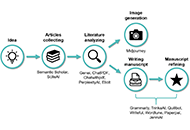 Rise of the machines: trends and challenges of implementing AI in biomedical scientific writingOpen AccessReviewArtificial intelligence (AI) technology is advancing significantly, with many applications already in medicine, healthcare, and biomedical research. Among these fields, the area that AI is remarkabl [...] Read more.Michal Fornalik ... Aleksandra ZielińskaPublished: September 04, 2024 Explor Digit Health Technol. 2024;2:235–248
Rise of the machines: trends and challenges of implementing AI in biomedical scientific writingOpen AccessReviewArtificial intelligence (AI) technology is advancing significantly, with many applications already in medicine, healthcare, and biomedical research. Among these fields, the area that AI is remarkabl [...] Read more.Michal Fornalik ... Aleksandra ZielińskaPublished: September 04, 2024 Explor Digit Health Technol. 2024;2:235–248
DOI: https://doi.org/10.37349/edht.2024.00024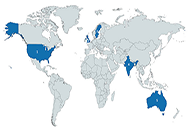 HUMANE: Harmonious Understanding of Machine Learning Analytics Network—global consensus for research on artificial intelligence in medicineOpen AccessOriginal ArticleAim: AI research, development, and implementation are expanding at an exponential pace across healthcare. This paradigm shift in healthcare research has led to increased demands for clinical outc [...] Read more.Neha Deo ... Rahul KashyapPublished: June 30, 2024 Explor Digit Health Technol. 2024;2:157–166
HUMANE: Harmonious Understanding of Machine Learning Analytics Network—global consensus for research on artificial intelligence in medicineOpen AccessOriginal ArticleAim: AI research, development, and implementation are expanding at an exponential pace across healthcare. This paradigm shift in healthcare research has led to increased demands for clinical outc [...] Read more.Neha Deo ... Rahul KashyapPublished: June 30, 2024 Explor Digit Health Technol. 2024;2:157–166
DOI: https://doi.org/10.37349/edht.2024.00018 Interaction of electromagnetic fields with body-onboard devicesOpen AccessMini ReviewThe aim of this contribution is to analyze and discuss the perturbations of body-onboard medical devices caused by electromagnetic field radiations. This involves their control via electromagnetic c [...] Read more.Adel RazekPublished: June 17, 2024 Explor Digit Health Technol. 2024;2:124–134
Interaction of electromagnetic fields with body-onboard devicesOpen AccessMini ReviewThe aim of this contribution is to analyze and discuss the perturbations of body-onboard medical devices caused by electromagnetic field radiations. This involves their control via electromagnetic c [...] Read more.Adel RazekPublished: June 17, 2024 Explor Digit Health Technol. 2024;2:124–134
DOI: https://doi.org/10.37349/edht.2024.00015
This article belongs to the special issue Biosensors for Bioactive Molecules -
